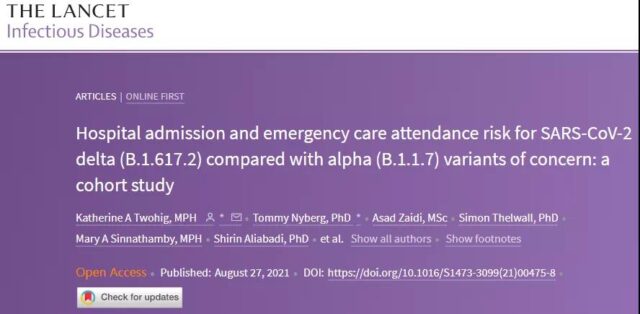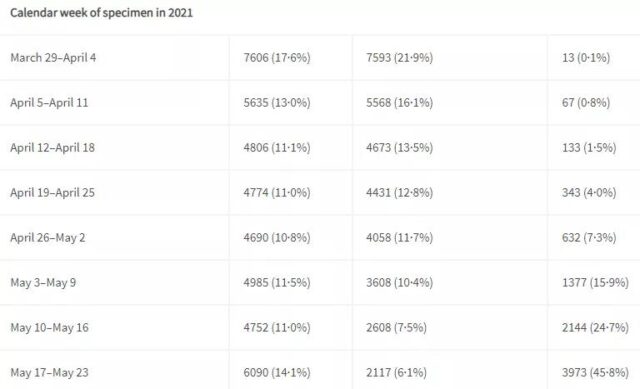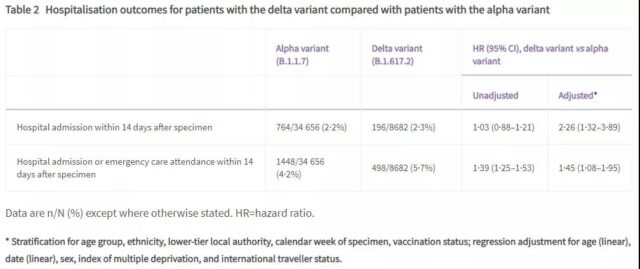Hospitalization for infection with Delta variants Twice as much as Alpha
- Why Botulinum Toxin Reigns as One of the Deadliest Poisons?
- FDA Approves Pfizer’s One-Time Gene Therapy for Hemophilia B: $3.5 Million per Dose
- Aspirin: Study Finds Greater Benefits for These Colorectal Cancer Patients
- Cancer Can Occur Without Genetic Mutations?
- Statins Lower Blood Lipids: How Long is a Course?
- Warning: Smartwatch Blood Sugar Measurement Deemed Dangerous
Hospitalization for infection with Delta variants Twice as much as Alpha
- Red Yeast Rice Scare Grips Japan: Over 114 Hospitalized and 5 Deaths
- Long COVID Brain Fog: Blood-Brain Barrier Damage and Persistent Inflammation
- FDA has mandated a top-level black box warning for all marketed CAR-T therapies
- Can people with high blood pressure eat peanuts?
- What is the difference between dopamine and dobutamine?
- How long can the patient live after heart stent surgery?
Hospitalization for infection with Delta variants Twice as much as Alpha
More than 40,000 confirmed cases based on whole-genome sequencing, the risk of hospitalization for infection with Delta variants was reported twice as much as Alpha for the first time
Brief Introduction:
In a study of 43,338 coronavirus cases published in The Lancet Infectious Diseases recently, it was reported for the first time that people infected with the Delta variant were twice as likely to be hospitalized as infected with the Alpha strain. All virus samples have undergone whole-genome sequencing, which is the most reliable way to confirm which mutation causes infection.
Recently, researchers published an article titled “Hospital admission and emergency care attendance risk for SARS-CoV-2 delta (B.1.617.2) compared with alpha (B.1.1.7) in The Lancet Infectious Diseases” magazine. ) variants of concern: a cohort study” a study confirmed that compared with those infected with the Alpha variant, the risk of hospitalization for people infected with the Delta variant is approximately twice that of the former. The study was conducted on more than 40,000 cases in the UK from March 29 to May 23, 2021.

Compared with the Alpha variant, the risk of being admitted to the hospital for emergency or hospital treatment within 14 days after infection with the Delta variant is also 1.5 times higher (the risk is increased by 1.45 times).
This new study reports the risk of hospitalization for Delta and Alpha variants for the first time, based on cases confirmed by whole-genome sequencing. Whole-genome sequencing is the most accurate method to determine virus mutations.
Dr. Gavin Dabrera is one of the lead authors of the study and an epidemiologist consultant to the National Infection Service of the Public Health Department of the United Kingdom. People are more likely to require hospitalization, although most of the cases included in the analysis were not vaccinated. We already know that vaccination can protect against Delta virus well, but this variant accounts for more than 98% of COVID-19 infections in the UK. Therefore, those It is important that people who have not received the two doses of the vaccine get the vaccine as soon as possible. If they develop symptoms related to COVID-19, it is still important to stay at home and get a PCR test as soon as possible.”
The Delta variant was first reported in India in December 2020. Earlier studies found that it was up to 50% higher than the previously dominant COVID-19 variant in the world, that is, the Alpha variant first discovered in Kent, UK.
A preliminary study from Scotland previously reported that the risk of hospitalization for the Delta variant was doubled compared with the Alpha variant, and it was suspected that the Delta variant was associated with more serious diseases. Previous studies used patients’ initial PCR test results and determined which mutation they had by detecting a specific gene that is more common in Delta mutations.
In this latest new coronavirus study, the researchers analyzed the medical data of 43,338 positive new coronavirus cases in the UK from March 29 to May 23, 2021, including vaccination status, emergency department visits, hospital admissions and Other demographic characteristics. In all the cases included in this study, virus samples collected from patients were sequenced through the whole genome to confirm which mutation caused the infection. During the study period, there were 34656 cases of Alpha variants (80%) and 8682 cases of Delta variants (20%). Although the percentage of Delta during the entire study period was 20%, in the week starting on May 17, 2021, new coronavirus cases accounted for two-thirds (65%, 3,973/6,090), which shows that it has surpassed Alpha. Become the main variant of the UK.

Among patients with coronavirus disease, approximately 1 in 50 patients was admitted to the hospital within 14 days of testing positive for the first COVID-19 (2.2% of Alpha cases, 764/34656; 2.3% of Delta cases, 196/8682). After considering factors (including age, race, and vaccination status) that are known to affect the susceptibility to serious diseases of the new coronavirus, the researchers found that the risk of hospitalization for patients with Delta mutation is more than twice that of patients with Alpha mutation (the risk increased by 2.26 times) ).

A number of studies have shown that for Alpha and Delta variants, comprehensive vaccination can prevent symptomatic infection and hospitalization. In fact, in this study, only 1.8% (794/43338) of the COVID-19 cases (regardless of the variant) were vaccinated with the two vaccine doses; 74% of the cases (32078/43338) were not vaccinated , 24% (10466/43338) were partially vaccinated. The authors point out that it is therefore impossible to draw statistically meaningful conclusions about the difference in hospitalization risk between people with Alpha and Delta infections after vaccination. Therefore, the results of this study mainly tell us the risk of hospitalization for unvaccinated or partially vaccinated people.
Dr. Anne Presanis is one of the principal investigators and senior statisticians of the MRC Department of Biostatistics at the University of Cambridge. He said: “Our analysis emphasizes that without vaccination, any Delta virus outbreak will be more severe than the Alpha epidemic. Medical care brings a greater burden. Comprehensive vaccination is essential to first reduce the risk of individuals contracting the Delta virus, and more importantly, to reduce the risk of serious illness and hospitalization for Delta patients.”
The author points out several limitations of the study. Some demographic groups may be more inclined to seek hospital care, which may bias the results, and the hospitalization policy may have changed during the study period, although adjustments to demographics and calendar time should minimize this bias . In addition, the author has not obtained information about the patient’s previous health status, which is known to affect the risk of serious illnesses from the new coronavirus. They indirectly used age, gender, race, and estimated socioeconomic poverty to explain this situation.
(source:internet, reference only)
Disclaimer of medicaltrend.org
Important Note: The information provided is for informational purposes only and should not be considered as medical advice.
- Red Yeast Rice Scare Grips Japan: Over 114 Hospitalized and 5 Deaths
- Long COVID Brain Fog: Blood-Brain Barrier Damage and Persistent Inflammation
- FDA has mandated a top-level black box warning for all marketed CAR-T therapies
- Can people with high blood pressure eat peanuts?
- What is the difference between dopamine and dobutamine?
- How long can the patient live after heart stent surgery?



